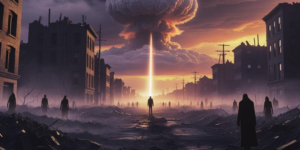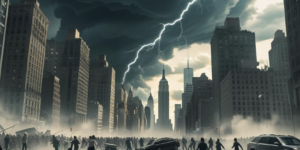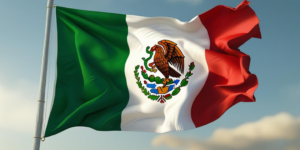Why Everyone Needs to Take Hell a Lot More Seriously
What happens to us at the moment of death, when our souls disconnect from our bodies? What happens when those souls transition into being pure spirits, without a brain and a nervous system?
What happens when the choosing mechanism of our will is stripped naked and is no longer tied to any material organism, no longer slowed down by physiological processes or biased by genetic and environmental factors?
This is a very mysterious subject, and we need to consider it carefully. Christianity has always taught that, at the moment of death, the human soul undergoes judgment on all the actions it has ever taken in its earthly existence. The whole notion of judgment presupposes that when we pass the moment of death, we no longer have the ability to influence our fate, to make a choice for or against God, to say yes or no to grace, to do good or evil, to have faith or not to have faith in Christ. All our power to alter our actions and decisions has come to an end. The time of testing is over. Essentially, our bodily choosing clock has stopped.
Why? The reason is that, at the very instant of its separation from the body, the human soul begins to live in the same manner as a pure spirit. Its decisions become unchangeable. And the unchangeable, irrevocable decision the soul makes when it first leaves its body is whatever decision it made when it was last joined with its body.
At the moment of death, we become similar to angels. With the body gone, all that is left is the intellect and the will that constitute the soul. When that soul is separated from the physical mechanism to which it’s been united for so long, it is no longer able to reverse course.
Remember, it is our weak, inefficient bodies that cause us to waffle in our decision-making. It’s what makes us go back and forth in our choices a million times. But that very weakness—the thing that makes us inferior to the angels in terms of our inability to know things instantaneously—is also what gives us so much time to make our choice about God when we are on earth.
But our time runs out at death. The state of our soul at the moment of separation determines our final choice about God. Once death comes, all processes of deliberation end abruptly. As humans, we make our decisions in slow motion, but the decision we freely arrive at by the time we die is the one that counts: it’s the one that is frozen. Our earthly obstinacy in either good or evil carries over, as if by momentum. At the moment of death, the soul’s will becomes immobile and fixes itself forever in its final choice—either for or against God. Like a tree that falls in the forest, wherever it hits the ground is where it stays.
To make this point even more clear, let’s take a close-up look at the soul of someone who actually goes to hell.
The unfortunate human being in question hasn’t simply made a mistake or given in to the temptations of the flesh. He has made a series of free choices in his life to reject the grace of God and the gift of faith. He has also made a series of free choices in his life to do seriously evil things and to persist in that evil. Deep inside this person’s soul, and completely independent of all environmental and genetic considerations, his will has continually rejected God’s will. When God gave this person the inspiration to repent, he said no. When opportunities to indulge in grave evil presented themselves, this person gave his free consent. In other words, long before this person’s soul separated from its body, a state of evil obstinacy had begun to take hold of it and actually changed it.
A person who continually refuses God’s grace and chooses instead to fester in evil is one who will increasingly and inevitably take on the hellish qualities of the devil and his demons. He will continually choose to lie, to accuse, to detract, to be selfish, to pridefully take offense, to engage in cynicism, hopelessness and a general rebellion against joy and life and God’s divine plan. And as his capacity for evil becomes greater with every unrepented sin, so his hidden soul becomes more soiled. If confronted with the truth about himself, this person will invariably express denial and outrage and flatly refuse to accept responsibility or recognize the need to change. On the outside, this person may be able to hide the truth and even successfully fool others into believing he is good. He may camouflage his coal-black soul with a pretty, pleasant and affable exterior. He may even mask his true selfishness with attention-getting acts of generosity. But God knows better. God sees inside the person and knows how hypocritical and twisted and dark his soul has actually become.
Now what happens to a person like this at the moment of death? What happens to this person’s obstinately evil soul? Some people believe that just before the soul separates from the body— even perhaps milliseconds before death and even if the person is unconscious—God gives one last chance, one final infusion of grace, in the hope that it will turn around in faith and repentance.
But that’s just speculation. No one knows for sure what happens between God and a human being who has just shuffled off this mortal coil. The only thing Christianity teaches with absolute certitude is that if a person is lost, it is not through any lack of mercy on God’s part.
Somehow, some way, God gives every person the chance to repent, just as he offers every person the gift of faith. Whether that chance or that gift is accepted is totally up to the individual. {eoa}
Anthony DeStefano is the bestselling author of 20 Christian books, including his latest, Hell: A Guide. His books have been published in 18 countries and 12 languages. He has also hosted two television series on Eternal Word Television Network (EWTN) and has received many awards and honors from religious organizations throughout the world. He is an avid pilot, a successful businessman and a longtime pro-life activist. He has appeared on many national radio and television programs, including The 700 Club, Dr. Dobson’s Family Talk and Focus on the Family. You can purchase the book here.




























































